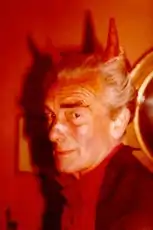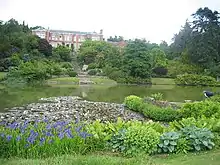Robert Heber-Percy
Robert Vernon Heber-Percy (5 November 1911 – 29 October 1987), known for much of his life as "the Mad Boy", was "an English eccentric in the grand tradition".[1]
Robert Heber-Percy | |
|---|---|
 | |
| Born | 5 November 1911 Shifnal, Shropshire, England |
| Died | 29 October 1987 (aged 75) |
| Education | Stowe School |
| Occupation | Eccentric |
| Spouse(s) | Jennifer Fry Lady Dorothy Lygon |
| Children | 1 |
| Relatives | Sir Geoffrey Fry, 1st Baronet (father-in-law) William Lygon, 7th Earl Beauchamp (father-in-law) Peter Zinovieff (son-in-law) Sofka Zinovieff (granddaughter) |

Early life
Heber-Percy was born in 1911, the fourth and youngest son of Algernon Hugh Heber-Percy (1869–1941), JP, of Hodnet Hall, Shropshire, and Gladys May (d. 1956), MBE, daughter of William Edward Montagu Hulton-Harrop, JP, DL, of Lythwood Hall, near Shrewsbury, Shropshire, and of Bardsley, Lancashire. Algernon Heber-Percy was a lieutenant in the Shropshire Yeomanry, and served as aide-de-camp to the Governor of Queensland, private secretary to the Lieutenant-Governor of British New Guinea, and was Hereditary Seneschal of Montgomery Castle. He was a descendant of Algernon Percy, 1st Earl of Beverley, of the family of the Dukes of Northumberland.[2][3]
Robert was raised at Hodnet Hall,[1] and brought up in country pursuits alongside his brothers, at which he excelled, particularly in riding, on the hunting field, and in breaking-in young horses; his brother Cyril wrote of him that "he was full of fun, up to every prank, could hoodwink most people, and developed a gift for repartee".[1][4][5] He was educated at Stowe School, and commissioned (reaching the rank of lieutenant) into the King's Dragoon Guards in a "brief but hectic" career.[1][2]
Career
Early work included acting as a Hollywood extra, serving in a Lyons' Corner House – which ended after he spilled soup on a customer – and helping to run a nightclub.[1]
Heber-Percy's main occupation was running – "with supreme efficiency" – the Faringdon House estate in Oxfordshire, owned by Lord Berners. Although he maintained a lively social life, with close friends including William Plomer, John and Penelope Betjeman, and Raymond Mortimer, Heber-Percy was dedicated to maintaining the estate, and woke up early to work in the fields alongside estate workers. He refused to increase rent for tenants of several decades' standing. Heber-Percy constructed follies and built "a swimming pool reached by high steps and overlooked by giant gryphons", with a changing room the floor of which "was inlaid with pennies".[1][6]
As a sideline, he and a carpenter friend went into business as undertakers; he was particularly fond of the company's annual conferences, as they "invariably provided him with a fund of good stories".[7][8]
During the Second World War, he was sent as a Secret Service emissary to the Balkans and Arabia.[5][1]
Personal life
Heber-Percy was the companion and lover of the composer Lord Berners until his death in 1950, when he inherited Faringdon House. Berners built a tower there commemorating Heber-Percy's 21st birthday; the latter later admitted he would rather have been given a horse.[5][1][9]
In 1942, he married an already pregnant Jennifer Fry, only child of Sir Geoffrey Fry, 1st Baronet.[10] They had a daughter, Victoria, born in 1943, but the marriage was dissolved in 1947.[1] All four of them lived together in Faringdon House, and were photographed by Cecil Beaton in September 1943.[9] The ménage à trois lasted two years before Jennifer and her daughter moved to her parents' home, Oare House, in Wiltshire.[11] Victoria Gala Heber-Percy married the engineer and inventor Peter Zinovieff, and they had three children, the eldest being the writer Sofka Zinovieff, who inherited the entirety of her grandfather's estate, including Faringdon House.[12][11] In 2014 Sofka Zinovieff wrote a memoir about Heber-Percy, Jennifer Fry and Lord Berners at Faringdon.[13]
Death
In 1985, he married Lady Dorothy Lygon, the fourth daughter of William Lygon, 7th Earl Beauchamp, whom he had known for over fifty years; this relationship "cheered his later years, when he was lame from a stroke and several brushes with death"[5] but they "parted amicably" a year later.[1][7] His ashes were scattered around the lake at Faringdon House.[1]
References
- "Robert Heber-Percy". Faringdon Community Website. South West Oxfordshire. Retrieved 24 September 2017.
- Burke's Peerage, Baronetage and Knightage, 107th edition, vol. 2, ed. Charles Mosley, Burke's Peerage Ltd, 2003, p. 2943
- Armorial Families, A. C. Fox-Davies, T. C. & E. C. Jack, Grange Publishing Works, 1895, p. 526
- Lord Berners- Composer, Writer, Painter, Peter Dickinson, Boydell Press, 2008, p. 72
- Obituaries: Robert Heber-Percy, Richard Brain, The Independent, 3 November 1987
- Obituaries: Robert Heber-Percy, Richard Brain, The Independent, 3 November 1987.
- "Lady Dorothy Heber Percy". telegraph.co.uk. 17 November 2001. Retrieved 24 September 2017.
- The Journals of Woodrow Wyatt: 1985–1988, Woodrow Wyatt, Macmillan, 1998, p. 616
- Hollinghurst, Alan (23 April 2015). "Serious, Silly, Charming, & Heartless". Retrieved 24 September 2017 – via www.nybooks.com.
{{cite magazine}}: Cite magazine requires|magazine=(help) - "Jennifer Ross". 24 September 2017. Retrieved 24 September 2017 – via www.telegraph.co.uk.
- "A Palladian gem immortalised by Nancy Mitford". houseandgarden.co.uk. Retrieved 24 September 2017.
- Beaumont-Thomas, Ben (20 October 2015). "Peter Zinovieff: 'I taught Ringo to play synth. He wasn't very good – but neither was I'". Retrieved 24 September 2017 – via www.theguardian.com.
- Sofka Zinovieff. The Mad Boy, Lord Berners, My Grandmother and Me (Jonathan Cape, 2014). ISBN 978-0-22409-659-1